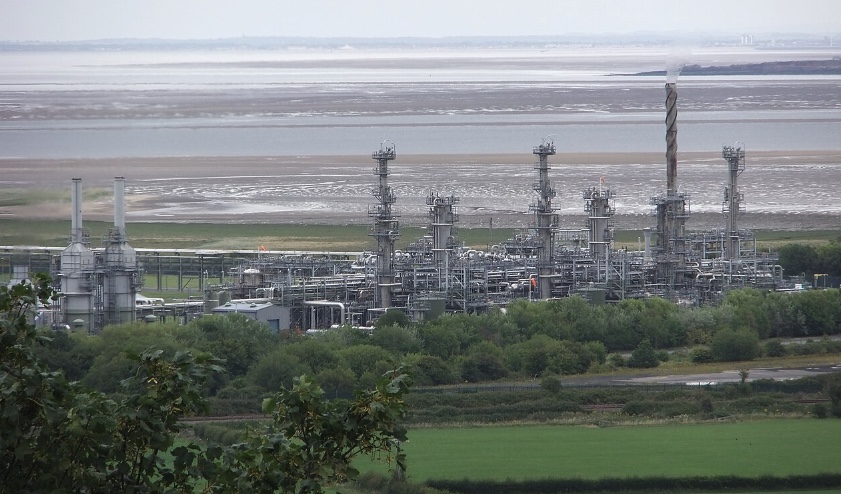Carbon Capture: North-East Wales at risk of becoming UK’s ‘exhaust pipe,’ warns Plaid politician

A North Wales politician raised concerns in the Senedd yesterday about the HyNet carbon capture and storage (CCS) project, which aims to store carbon dioxide emissions from major industrial sites under the seabed off the North Wales coast.
Plans for a 60.4 km pipeline to transport CO2 from industrial areas in North West England and North Wales through Deeside to depleted gas reservoirs in Liverpool Bay were approved in March.
The project includes 36.4 km of new construction, with the largest section between Stanlow and Flint, and 20 km of existing natural gas pipelines will be repurposed.
The pipeline will transport up to 4.5 million metric tons of CO2 annually, supported by infrastructure like Above Ground Installations (AGIs) and Block Valve Stations (BVSs) in Flintshire.
The hydrogen will be produced by Vertex Hydrogen at the Stanlow Manufacturing Complex in Ellesmere Port, which will be decarbonised to produce blue hydrogen.
This hydrogen will be piped to industrial users and power generators, while the CO2 by-product will be stored in depleted oil and gas fields in Liverpool Bay.
HyNet is being fuelled by millions in funding from the UK Government, alongside private investment by HyNet’s consortium partners
Llyr Gruffydd MS, Plaid Cymru’s regional member for North Wales, expressed grave reservations about the safety of the project.
Mr Gruffydd highlighted the risks he says CCS poses to local communities, pointing to incidents in other countries where leaks have resulted in hospitalisation and asphyxiation.
“Are we willing to expose the people of north-east Wales to becoming the exhaust pipe of the United Kingdom?” Mr Gruffydd asked, accusing the Welsh Government of being too passive on the issue.”
Why is Labour happy for Flintshire to become the exhaust pipe of the UK?
Carbon Capture & Storage brings risks to public health.@DeesideDotCom @HeraldWales pic.twitter.com/BgkCz7qqcX— Llyr Gruffydd AS/MS (@LlyrGruffydd) October 23, 2024
He emphasised that the technology could allow major polluters to continue emissions rather than transitioning to cleaner alternatives.
Mark Isherwood MS, Conservative regional member for North Wales, called on the Senedd to recognise CCS as a vital part of the UK’s net-zero strategy.
Mr Isherwood argued that HyNet, which has received £72 million from the UK Government, would be essential in decarbonising hard-to-abate industries, such as cement production in Flintshire, and in generating low-carbon hydrogen for energy.
“We need carbon capture to meet our targets,” Mr Isherwood said, referencing international support for CCS as a necessary step to reduce emissions.
Hannah Blythyn MS, Labour MS for Delyn, raised specific concerns about the local impact of the project, particularly the construction of new pipelines between Padeswood and Northop Hall.
Ms Blythyn stressed the need for proper consultation with affected communities and significant compensation for disruption.
“We need to ensure local voices are heard and that this doesn’t come at the cost of our communities,” she said.
The concerns raised in the Senedd reflect broader unease as highlighted by Carolyn Thomas MS, a Welsh Labour and Co-operative regional member for North Wales.
In her recent column for The Leader, Ms Thomas criticised the HyNet project for “greenwashing,” suggesting that it may serve as a way for fossil fuel companies to continue harmful extraction under the guise of sustainability.
In the column, Ms Thomas questioned the safety of transporting and storing carbon dioxide, citing Health and Safety Executive warnings about the relatively unknown behaviour of CO2 in such projects.
She also criticised the compensation offered to local communities, calling it “woefully inadequate” in light of the potential disruptions.
Additionally, Ms Thomas called for the £22 billion being spent on CCS to be redirected toward other priorities, such as renewable energy projects, home insulation grants, and building low-carbon social housing.
Ms Thomas argued that these alternatives would provide more immediate benefits to the community and help address urgent job vacancies in areas like health and education, rather than risking the long-term consequences of an unproven technology.










